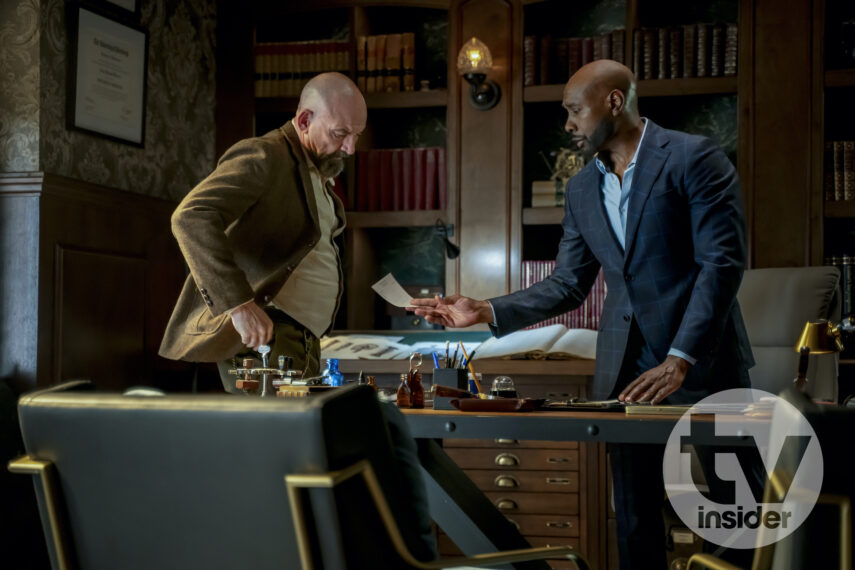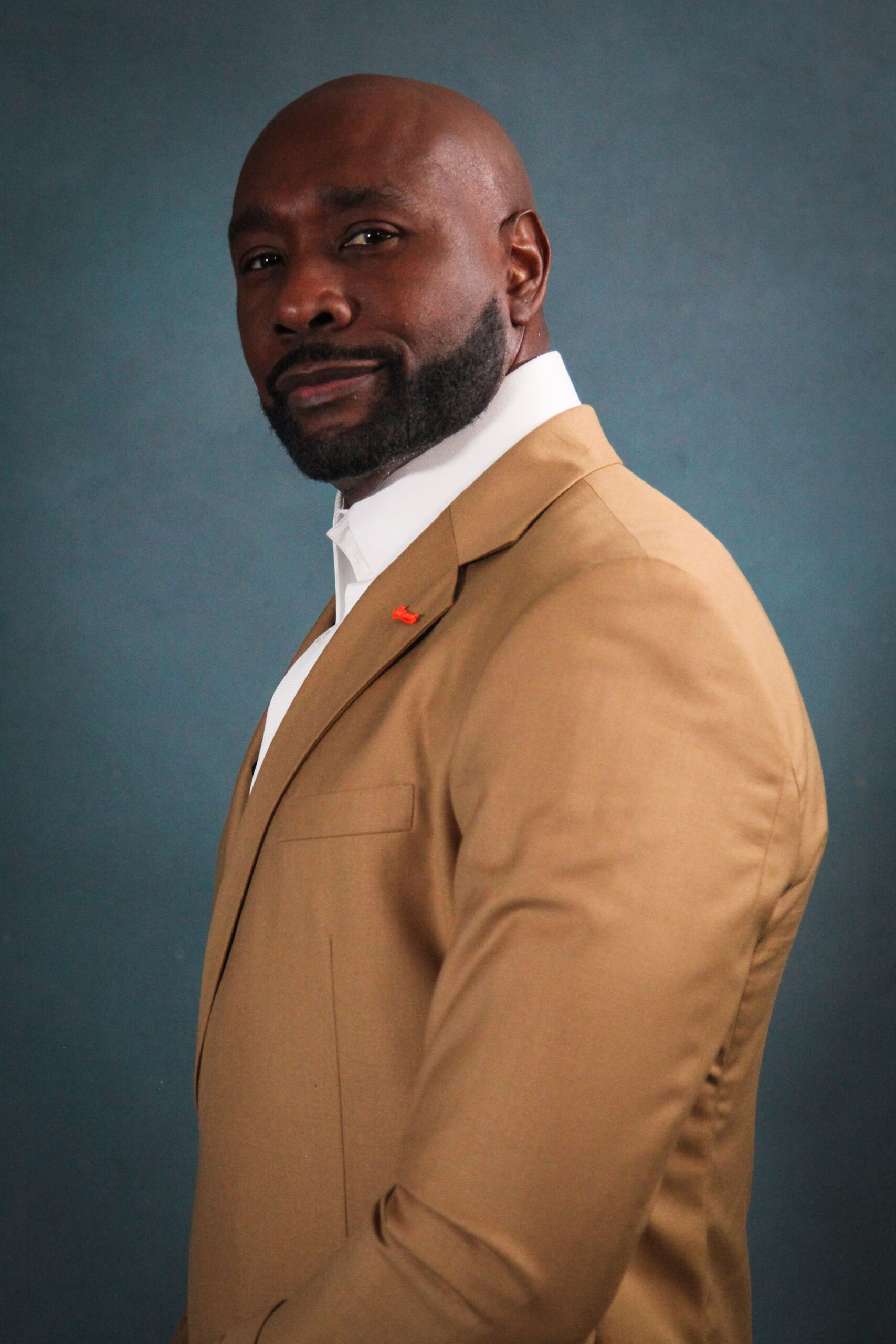Morris Chestnut’s Not-So-Elementary ‘Watson’
A brilliant but unconventional doctor leading a team of fellows and solving medical mysteries.
A brilliant but unconventional doctor leading a team of fellows and solving medical mysteries — how do you keep the new CBS medical drama Watson from just being House? Simply put: Morris Chestnut.
“Morris cares about everyone he comes in contact with and is very deliberate about being kind and treating everybody the same way,” Watson executive producer Craig Sweeny explains of his leading man, whom he reveals he pictured in the role of Dr. John Watson when first writing the pilot of this modern-day take on Sir Arthur Conan Doyle’s work. (It’s his second foray; he also executive produced CBS’ Elementary.) “When you’re writing a long-form TV show, you inevitably start to write to the qualities of the performers, and so that became a really defining trait of Watson’s in a great way that I think really works for the show.”
For Chestnut, the connection to the source material was a big pull. “I just love being a part of the Sherlock Holmes mythology, having access to the incredible storylines, the incredible, rich characters,” he says while chatting with TV Insider at our office.
The series had a special premiere on January 26; on February 16, it settles into its regular time slot of 9/8c beginning with the second episode. The action began with the iconic doctor’s friend and partner, sleuth Sherlock Holmes, at Reichenbach Falls with his nemesis Moriarty; when they went into the water, Dr. John Watson followed, and only he emerged, with a traumatic brain injury. Six months later, he’s still feeling the effects of his attempted heroic act. He runs a clinic in Pittsburgh with a team of fellows. His boss is his soon-to-be ex-wife, Dr. Mary Morstan (Rochelle Aytes). His right-hand man is Shinwell Johnson (Ritchie Coster) … who brings samples from the clinic to none other than Moriarty (Randall Park, whose casting was a secret until the pilot aired); why he’s working for him will be revealed this season.
“Watson’s really trying to hold it together in the midst of all the complications that Moriarty is bringing into his life,” Chestnut teases. But can he?

Eduardo Araquel/CBS
A Betrayal in Pittsburgh: Watson vs. Moriarty … and Shinwell?
Just after one scene in the pilot, we can already tell that Park has a grasp on the chilling villain, a departure from his usual roles. “He’s more or less the friendliest man in the world,” Sweeny says of the actor. “I like to ask: What kind of sinister thing might lie beneath that, that sort of veneer of pleasantness? How do you make Randall Park evil?”
That was also the pitch that Park received when Sweeny called him. He was surprised at first because he’s known more for, as he puts it, playing “kindhearted silly characters in comedy.” The executive producer explained, Park shares, “‘That’s the point. We want it to be surprising. We want [Moriarty] to feel like an everyman, which makes him even more dangerous and unpredictable.'”
Chestnut praises his performance: “Randall was so good he was kind of scary because he’s such a nice guy. The audience will see so many colors and nuances that Randall has [added] to this villainous role. As Moriarty, he’s a really scary guy.”
With Sherlock dead, the focus turns the page to the chapter of Watson’s story with Moriarty. “For Watson, it is a great opportunity to match wits with the only person that’s really gotten the best of Sherlock,” Chestnut notes, as well as “to avenge the death of his best friend. I don’t know if you ever get to do that, but that’s what he wants and drives him.”
Sweeny sees it as “the ultimate test” for the doctor. “What better way for Watson to face the challenge of no longer having his partner than to be forced to go up against the man who essentially defeated his partner?” he asks. “How better to define Watson as the leading man, worthy of his own show, than to go up against Moriarty?”
From Moriarty’s perspective, Watson is “an opportunity,” says Park. “Moriarty knows of Watson’s brilliance. He’s very familiar with what Watson can do, what he’s capable of, and of Watson’s heart and where his heart lies. Also, he knows that Watson is deeply mourning the loss of his partner. All of that plays into Moriarty’s calculus. It’s just an opportunity for power and chaos.”
The literary villain is already stirring up chaos, though Watson doesn’t know it, with Shinwell reluctantly working for him. “Shinwell is not betraying Watson out of passion for betraying Watson,” promises Sweeny. “He is caught on the horns of a very, very savage dilemma that plays itself out over the course of the season.”
Chestnut loved that reveal in the first episode. “When I was reading the script for the first time, I had no idea that was coming,” he shares. “That reveal just ramped up the stakes. That’s what I love about the show. Although it has a procedural element, where we solve a medical case every episode, it also has a very strong serialized element. Each week, the audience is finding out more information. There’s more to be revealed about the characters, about the stories that leads up to the climactic peak in the finale.”
He’s looking forward to the audience finding out “the degree in which he’s betrayed.” Plus, Chestnut wonders, “Is [Shinwell] the only person betraying him?”
Why Shinwell? Park says he and Moriarty have a history. “He knows that Shinwell is capable of being used in this way because of his background. Moriarty is very much a master manipulator and he knows the psychological profile of everyone on the chess board. He also sees Shinwell as an opportunity. And because of Shinwell’s relationship with Watson, it very much makes sense for Moriarty to control that chess piece.”
The Man With the TBI: Watson’s Recovery
Something that will continue to be apparent is that Watson’s TBI is very much a concern, but it’s also led to one positive change for the doctor. “He can relate to patients a little bit better now because he himself has been in bad shape and has been a patient,” says Chestnut.
Watson is still figuring his life out after everything that’s happened — and how to deal with his injury. Warns Sweeny, “He’s self-medicating, and Moriarty’s ability to monkey with those medications is a very important thing as we advance through the season.”
Also a factor in Watson’s recovery is his neurologist, Dr. Ingrid Derian (Eve Harlow), who is part of his team of fellows. Watson “holds her on a slightly different level intellectually” than the others, Dr. Stephens and Adam Croft (Peter Mark Kendall pulling double duty as the very different twins) and Dr. Sasha Lubbock (Inga Schlingmann), Sweeny teases.
The fellows suspect, and Chestnut confirms, that Watson has brought on each to study them. “He brings people into his life, particularly these individuals, that he loves to study and learn [from],” he explains.
But there is a question of whether or not Ingrid fits that label. She is, after all, also his doctor. “Is that just a relationship of convenience because Watson wants his neurologist to be under his thumb, his employee essentially, or will he eventually submit to her care?” asks Sweeny.
A Study in Relationships: Who Are Watson and Mary to Each Other Now?
A very layered relationship is Watson and Mary’s; they’re exes whose relationship unraveled after he picked Sherlock and their work over her, but she’s also his boss and the person who arguably knows him the best given their history.
“It’s fun playing the levels,” Chestnut says. “Sometimes Watson knows what he did was something that he can’t take back, and he’s really remorseful for his behavior in following Sherlock. Mary doesn’t want to let him in. The fun is trying to get her to crack, trying to get her to loosen up a little bit when it comes to Watson and what he did with their marriage. There are going to be a few things that are revealed about the relationship later on in the season that will shock the audience.”
With the complicated dynamics at play, “the performers and I are always checking in on, which facet of the relationship is most present in this scene?” according to Sweeny. “They’re not done with each other yet [or] ready to move on.”
They’re still trying to figure out what they are to each other, making for what he calls “such a delicate balance.” Mary’s the one trying to “maintain” it, adds Aytes. “A lot of the times, Watson is bringing the personal relationship stuff back in it, and I’m trying to keep it business because they have these medical mysteries, and she wants to help the patients.”
The premiere did reveal that Mary’s in a new relationship, with a woman Watson never met. With that, “you’ll see his jealous side come out,” teases Aytes.
She also raves about working with Chestnut. “As an actor, he gives you everything. He’s like, ‘Hey, do you want to run lines? We can run lines over and over again. Let’s talk about it. Let’s figure this out.’ He’s so open,” she shares.

Matt Stevens
The Final Problem: Is Sherlock Holmes Really Dead?
It’s the question that has to be asked since we have not seen a body. All we know is what Shinwell tells Watson: that Sherlock is dead. And as Chestnut points out, “Shinwell, as we saw in the first episode, has a tendency to possibly not be trusted.” He teases, “We’ll see if he’s actually dead.”
Sweeny says that Watson is taking Shinwell at his word — for most of the first season. “There are some questions that come in towards the end, and we have Matt Berry from What We Do in the Shadows as the voice of Sherlock Holmes who appears in hallucinations,” the EP reveals. He can’t say if Sherlock were to appear onscreen if it would be Berry or someone else. “I feel it might be violating the deal-making gods,” he says. “Certainly he would be an amazing Sherlock.”
It’s unclear how much Watson’s hallucinations hint at what the real Sherlock was like. “He’s not a reliable narrator in that moment,” says Sweeny. “Watson sort of resents [seeing Sherlock since] he’s trying to move on. In these moments of crisis, Sherlock jumps into his head, and I believe he says in that episode, ‘I miss you terribly, but I wish you would shut the hell up.’ Those voices only make him miss his friend more because it’s not the real thing.”
The Familiar Detectives: Which Other Sherlock Characters Will Appear?
The premiere mentioned the character of Gregson, a Scotland Yard inspector in the Sherlock Holmes canon. Sweeny says he won’t appear onscreen, but another inspector will — with a twist. “Lestrade, in our universe, is a detective in Pittsburgh,” he shares. “They meet in Episode 10 and collaborate on a case. That’s very much going to be an ongoing relationship.” Casting remains a secret.
When it comes to other characters from Doyle’s books, “there’s a visual hallucination as well, but we don’t define who that is. It’s very impressionistic,” the exec producer teases.
Sounds like the perfect case for doc-tective John Watson.
Watson, Time-Period Premiere, Sunday, February 16, 9/8c, CBS
